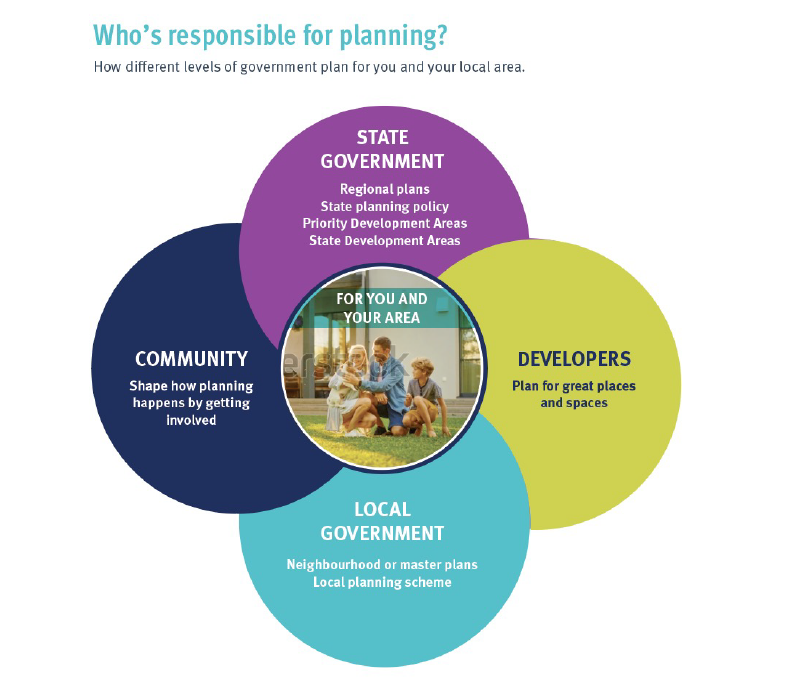All levels of government and the private sector play a role in land use planning, infrastructure and services needed to support our community. The state government and local councils primarily share responsibility for land use planning. The property and development industry plan, propose and undertake development to create great places, and communities contribute to shaping their futures by having their say on planning.

Queensland Government
The Queensland Government plans how growth will be managed across the state and regions through various plan-making tools.
State Plan-Making
The state government plans express their key state and regional interests in land-use planning primarily through the State Planning Policy and regional plans.
The State Planning Policy outlines the current state interests which guides how councils should plan for housing, economic growth, the environment, resilience to natural hazards and infrastructure. Local councils need to consider these state’s interest in their planning schemes.
Regional plans set out long-term strategies to guide growth and support future jobs specific to each region’s needs. These plans set job and growth targets while protecting each region’s liveability, natural resources and environment. The state government’s key regional interests encompassing Ipswich are set by the South East Queensland Regional Plan - ShapingSEQ.
Priority Development Areas
The state government can also declare priority development areas (PDAs)to promote accelerated development opportunities focused on economic, community and social growth. The Ripley Valley Priority Development Area was declared by the Queensland Government in 2010 to support our city in meeting its growing housing needs.
Legislation
The state government also set the rules for local governments and other users of the planning system to follow through legislation. These planning rules form the process and requirements when making or changing local planning schemes, development assessment and dispute resolution.
To learn more, visit the Queensland Government's planning framework website.
Local Governments
Each local government across Queensland is responsible for the planning of their communities’ future growth and change. This long term vision and direction is set out in the local government’s local planning scheme.
Planning schemes are a legal document that the community, development industry and governments all look to in order to understand their local government’s plan for managing this future growth and change. Planning Schemes are a rule book to help guide the range of development and change that we want to facilitate, protect the features that we want to keep and prevent things we don’t want to see.
Property and Development Industry
The property and development industry can consist of private companies, small developers (including individuals and one-time developers), and not-for-profit groups.
The property and development industry must follow planning requirements and development assessment processes when building on or using their land. Good developments can help us grow sustainably and deliver jobs and growth that are needed for our community.
Local planning schemes outline how your area could grow and change in the future, and the development industry plays an important role in bringing that to life.
Community
The community can play a key role in shaping their future by getting involved and commenting on state, regional and local plans as well as some proposed developments.
The best time for the community to express their views and have a real influence on what should and should not happen in an area, is with the preparation of amendments to our city’s planning scheme. To find out more about or register your interest in future opportunities to comment on council projects in Ipswich, including the development of the Ipswich City Plan 2025, click this link to help Shape Your Ipswich. You can also get the latest from Planning and Development directly by subscribing to eAlerts – here. The community can also make formal submissions to Impact Assessable development applications during their public notification period – here.